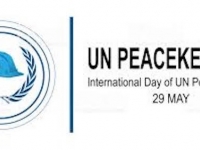News
JOINT STATEMENT BY THE EU & UN FOR THE FOR THE UNSC RESOLUTION 1325
ELIMINATION SEXUAL VIOLENCE IN CONFLICT

European Union logo (Source: European Union)
USPA NEWS -
We are publishing the full text of the following Joint statement that was released by the the European Union and the United Nations about International day for the elimination of sexual Violence in Conflict. about the challenges faced by the two countries, (Issued by the U.S. Department of State Office)The 20th anniversary of UN Security Council Resolution 1325 should represent a ground-breaking milestone for the Women, Peace and Security agenda. Instead, the COVID-19 pandemic has put at risk the progress achieved so far, in particular for survivors and those at risk of conflict-related sexual violence in places where fighting is rife and governance is weak.On the International Day for the Elimination of Sexual Violence in Conflict, the United Nations and the European Union join their voices to call on the international community to accelerate its efforts to eliminate the scourge of sexual and gender-based violence.
The 20th anniversary of UN Security Council Resolution 1325 should represent a ground-breaking milestone for the Women, Peace and Security agenda. Instead, the COVID-19 pandemic has put at risk the progress achieved so far, in particular for survivors and those at risk of conflict-related sexual violence in places where fighting is rife and governance is weak.
On the International Day for the Elimination of Sexual Violence in Conflict, the United Nations and the European Union join their voices to call on the international community to accelerate its efforts to eliminate the scourge of sexual and gender-based violence.
The implications of the COVID-19 pandemic are far-reaching and manifold worldwide. The pandemic poses a significant threat to the maintenance of peace and security, as well increased risks of violence. It entails particularly devastating risks for women and girls in fragile and conflict-affected contexts and creates an environment that may worsen violence against women and children, including sexual violence and intimate partner violence. Victims of conflict-related sexual violence are amongst those bearing the brunt of the pandemic. We need to ensure a pandemic response and recovery, based on the full respect of human rights for all, that pays particular attention to their needs and concerns.
The voices of the survivors of conflict-related sexual violence risk being silenced and forgotten. Current restrictions on people´s movement impede survivors´ access to essential services, including security, protection and sexual and reproductive health services, and hamper them in seeking justice. The pandemic is having a detrimental impact on the rule of law response, including accountability for conflict-related sexual violence. For instance, it prevents law enforcement officials from investigating incidents of sexual violence and judicial authorities to hear cases.
Quarantines and other restrictions on movement are disrupting the work of United Nations entities in gathering information, verifying violations and enhancing compliance by both State and non-State parties with international obligations, including the prohibition on conflict-related sexual violence. We are committed to further strengthening their work to mitigate the impact of the pandemic on the lives of survivors of conflict-related sexual violence, especially in terms of support to help them rebuild their lives and livelihoods.
There must be a shift in social attitudes at all levels. This can be achieved by ensuring that the voices of the survivors and those at risk are listened to, while ensuring women´s participation in decision-making and peacebuilding processes. More than ever, governments must be transparent, responsive and accountable. Civil society, international and regional organisations, human rights defenders, peacebuilders and traditional and religious leaders, the media and the private sector have essential roles to play in challenging the harmful gender norms that perpetuate sexual violence.
On this day, we re-commit to working together to prevent conflict-related sexual violence, to protect its victims, to end impunity for its perpetrators, and to guarantee access to justice, reparations and redress for survivors. Their voices should guide our efforts to ensure safer, fairer, more secure and more peaceful societies. Source: EU, UN.
Ue Un International Day Elimination Of Sexual Violence On Conflict Unscr Resolution 1325 Jedi Foster Rahm Sophia Rachdi
Liability for this article lies with the author, who also holds the copyright. Editorial content from USPA may be quoted on other websites as long as the quote comprises no more than 5% of the entire text, is marked as such and the source is named (via hyperlink).







